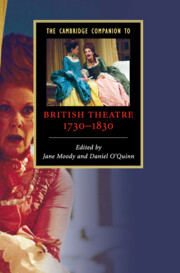Book contents
- Frontmatter
- Part I Performance
- Part II Genres
- Part III Identities
- 9 The making of an English audience: the case of the footmen’s gallery
- 10 Women playwrights
- 11 Entertaining women: the actress in eighteenth-century theatre and culture
- 12 Race and profit in English theatre
- Part IV Places of Performance
- Part V Further Reading
- Bibliography
- Index
- Series list
11 - Entertaining women: the actress in eighteenth-century theatre and culture
from Part III - Identities
Published online by Cambridge University Press: 28 May 2009
- Frontmatter
- Part I Performance
- Part II Genres
- Part III Identities
- 9 The making of an English audience: the case of the footmen’s gallery
- 10 Women playwrights
- 11 Entertaining women: the actress in eighteenth-century theatre and culture
- 12 Race and profit in English theatre
- Part IV Places of Performance
- Part V Further Reading
- Bibliography
- Index
- Series list
Summary
Actresses and sexual reputation
When English women first appeared on the public stage at the Restoration, some critics slighted them, in part by calling them whores. By the eighteenth century, however, women's place in performance had been fully established: while many public spaces, such as the century's famous coffee houses, excluded women, the playhouse simply could not function without them. Contemporary responses, nevertheless, remind us of the continuing volatility of the female body on stage - a result, at least in part, of the actress's indirect challenge to gender expectations.
Of course, all performers in this period became vulnerable to speculations about their personal lives. Yet sexual suspicion occupied an even greater part of the response to actresses: it is difficult to find a biography of an actress that does not devote significant energy to positioning its subject somewhere on (or off) the spectrum of female virtue. Critics have therefore debated whether contemporaries considered actresses as 'prostitutes or ladies', as 'reified objects or emergent professionals'. We need, however, to place this important question in the broader context of changing constructions of gender, the marketplace and the distinctiveness of eighteenth-century theatre culture instead of debating what might be a false opposition. By doing so, we can arrive at a more nuanced reading of the intertwined reputations of these two female professions (acting and prostitution) and thus achieve a better understanding of the actress's cultural position. The emergence in this period of an urban media culture, which offered to paying consumers an unprecedented variety of entertainment, located theatre as one choice in an expanding cultural market which ranged from the virtuous to the lurid. While conforming in some ways to the new bourgeois rhetoric of propriety, the stage also offered an intriguing though sometimes scandalous alternative to traditional hierarchies of rank and emerging ideologies of gender.
- Type
- Chapter
- Information
- The Cambridge Companion to British Theatre, 1730–1830 , pp. 159 - 174Publisher: Cambridge University PressPrint publication year: 2007
- 3
- Cited by



